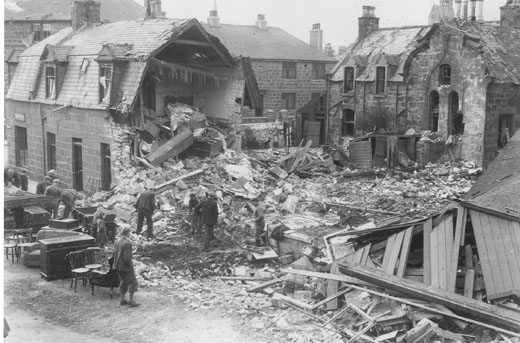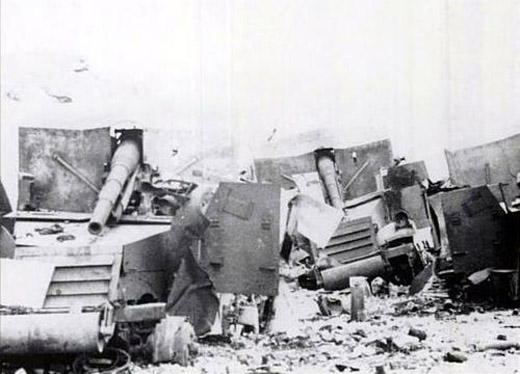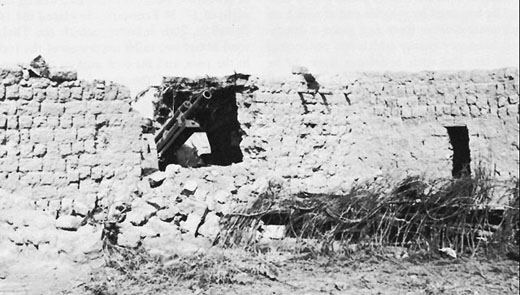Air Operations, Aleutians
5 28th Composite Bomb Group B-24s, 7 B-25s, and 8 343d Fighter Group P-38s attack Kiska.
[Air Operations, Bismarcks
43rd Heavy Bomb Group B-17s attack the Gasmata airfield on New Britain.
[Air Operations, CBI
BURMA- 13 7th Heavy Bomb Group B-24s attack the Gokteik viaduct.
- 16 51st Fighter Group P-40s attack a factory, rail targets, and oil storage at Sahmaw.
Air Operations, Europe
BOMBER COMMANDEvening Ops:
- 20 Wellingtons lay mines in the Frisians.
- 1 Wellington is lost.
Bomb Damage in Fraserburgh |
 |
Air Operations, Gilberts
3 7th Air Force B-24s based at Canton Island photograph Abaiang, Makin, and Tarawa atolls, and 1 B-24 attacks shipping at Tarawa Atoll.
[Air Operations, Solomons
- V Bomber Command B-17s, XIII Bomber Command B-17s, and VB-101 PB4Ys attack Ballale and the Kahili airfield on Bougainville.
- 307th Heavy Bomb Group B-24s attack the Vila airfield on Kolombangara.
Air Operations, Tunisia
12th Air Force P-39s strafe German Army trucks and armored vehicles around Kasserine Pass as powerful German Army ground units break through the Allied front line and proceed toward Thala and Tebessa.
[Britain, Home Front
The 25th anniversary of the creation of the Red Army is celebrated throughout Britain and the Empire by demonstrations, public meetings and military parades during the weekend. George VI sends a personal message to Pres Mikhail Kalinin. A Sword of Honor is to be presented to the city of Stalingrad.
[Eastern Front
In the region south and southwest of Kharkov the Russians capture Pavlograd and are involved in fierce fighting at Krasnograd. They continue to close in on Orel from the east, south and southwest repulsing fierce German counterattacks led by von Manstein's Panzers. They fail to realize that, although they are making rapid progress toward the Dniepr, they are in fact driving in to a salient which is strongly held on both flanks.
SOUTHERN SECTORWest of Kharkov the 40th Army reaches a line Krasnopolye-Akhtyka as Corps Raus continues to fall back.
Manstein's carefully prepared counterattack grows in ferocity as 2nd SS Panzer Corps slices through the flank of the 6th Army, which also comes under ferocious Luftwaffe attack at Pavlograd. South of Krasnograd, the SS Panzer Corps links up with elements of the XLVIII Panzer Corps attacking from Kovomosskovsk. This precipitates a Soviet withdrawal across the Samara but some units are isolated west of Novomosskovsk.
The XL Panzer Corps attacks Group Popov. Popov's understrength tank corps attempst to hold off the German tide but to no avail. Under intense pressure, he requests permission to withdraw but is ordered by Vatutin to continues his attack. Group Hollidt is again heavily attacked along the Mius position.
[North Africa
TUNISIAThe Axis forces are re-grouped and Gen Giovanni Messe takes command of the Italian 1st Army. The Axis armored army under Rommel ceases to exist though Rommel stays in command in Africa for a few weeks more. The German attacks on Sbiba are held by the defending British and American units of which the most prominent is a British Guards Bde. The attack through Kasserine Pass is held at first, but later the detachment of 15th Pzr is joined by units from 10th Pzr and the assault goes home. The US II Corps falls back to avoid being totally routed. Later in the day the Germans drive to within 10 miles of Thala despite the resistance of the British 26th Arm Bde which has come up.
Knocked-out Column of M3 75-mm GMCs |
 |
In eastern Tunisia the 8th Army captures Medenine.
The Allied command in the theater is reorganized and Gen Alexander is appointed to lead the newly constituted 18th Army Group.
Axis forces are being reorganized. Gen Messe assumes command of the Italian 1st Army as Rommel's German-Italian Panzer Army ceases to exist. Rommel will remain in Tunisia for a few weeks longer.
In the British 1st Army area, the French XIX Corps repels another enemy attack against Sbiba, after which the enemy in the area shifts from the offensive to aggressive defensive. The US 1st Div moves to Bou Chebka and reverts to the US II Corps. In the US II Corps area, the Germans break through Kasserine Pass and thrust northward toward Thala and westward toward Tébessa. The British 26th Brigade of the 6th Armored Div, under Brig C. G. G. Nicholson, is given the responsibility, under II Corps control, for co-ordinating operations to check the enemy and restore lost positions. Nicholson's force is to operate northeast of the Hatab River before Thala. Combat Command B, 1st Armored Div, under the command of Nicholson, and other troops operating south of the Hatab are to defend the passes in Djebel el Hamra before Tébessa. Preparations are made for a counterattack on the 21st.
T105-mm Howitzer of the 33rd Field Arty Bn |
 |
Pacific
The US submarine Halibut (SS-232) torpedoes and sinks the Japanese transport Shinkoku Maru (3991t) about 450 miles north of Ponape, Carolines.
[